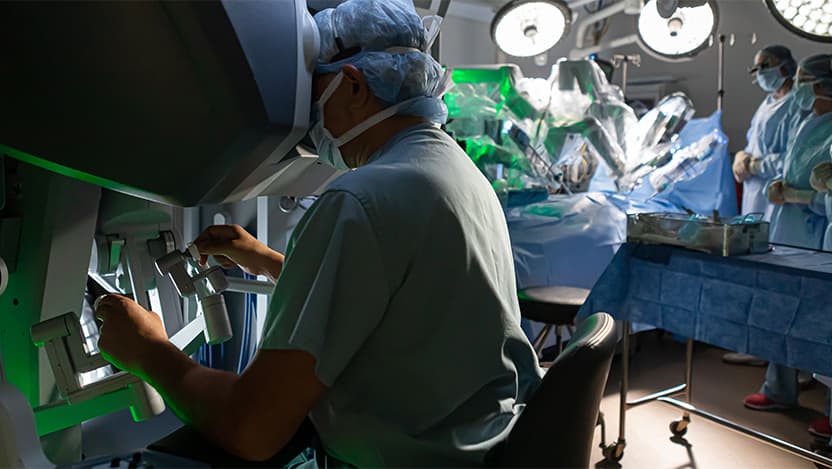Unique, minimally invasive robotic MAZE surgery normalizes heart rate for AFib patient

Scott Reber leads an active life, climbing on tractors at his Utah ranch, piloting his own plane to his Las Vegas car dealership and playing with his four grandsons.
But back in 2017, Reber felt rotten. He was tired all the time. Small actions, like walking up a few stairs or taking a shower, gave him heart palpitations and left him winded.
“I’m strong as an ox, normally, but I felt like I was going to die,” the 57-year-old said.
Reber went to the doctor, where his heart rate was 240 – almost triple the normal rate. His physician feared Reber was having a massive stroke and sent him straight to the emergency room. Reber didn’t have a stroke but was diagnosed with atrial fibrillation, or AFib.
AFib is a common heart arrhythmia that causes the heart to beat irregularly, usually too quickly but sometimes too slowly. The diagnosis posed a huge problem for Reber, a licensed pilot who needs to pass a flight physical each year. If his AFib was not well-controlled, his pilot’s license would be revoked.
For the next few years, Reber treated his AFib with blood thinners, antiarrhythmic medications and two heart ablation procedures to normalize his heart rate.
Ablations are often successful treatments for patients with AFib. The procedure involves inserting a catheter into the heart to create small scars in the heart’s upper chamber, disrupting the signals that cause the heart to beat erratically.
However, Reber’s first ablation, in 2017, worked for only a week. The second, in 2018, restored his heart rhythm to normal for a few weeks. With seemingly no other options, Reber scheduled a third ablation.
“I said to the doctor, ‘Look, what are you gonna do different this time? Because this isn’t working and my insurance company is about done paying for this,’” he said.
Reber’s friend suggested he talk to an electrophysiologist he knew in Missouri. That doctor told Reber about cardiac surgeon Husam H. Balkhy, MD at the University of Chicago Medicine. He’d been referring his difficult AFib patients to Balkhy for years, since UChicago Medicine is one of the few places in the world that performs a robotic minimally invasive surgical ablation known as the
But back in 2017, Reber felt rotten. He was tired all the time. Small actions, like walking up a few stairs or taking a shower, gave him heart palpitations and left him winded.
“I’m strong as an ox, normally, but I felt like I was going to die,” the 57-year-old said.
Reber went to the doctor, where his heart rate was 240 – almost triple the normal rate. His physician feared Reber was having a massive stroke and sent him straight to the emergency room. Reber didn’t have a stroke but was diagnosed with atrial fibrillation, or AFib.
AFib is a common heart arrhythmia that causes the heart to beat irregularly, usually too quickly but sometimes too slowly. The diagnosis posed a huge problem for Reber, a licensed pilot who needs to pass a flight physical each year. If his AFib was not well-controlled, his pilot’s license would be revoked.
For the next few years, Reber treated his AFib with blood thinners, antiarrhythmic medications and two heart ablation procedures to normalize his heart rate.
Ablations are often successful treatments for patients with AFib. The procedure involves inserting a catheter into the heart to create small scars in the heart’s upper chamber, disrupting the signals that cause the heart to beat erratically.
However, Reber’s first ablation, in 2017, worked for only a week. The second, in 2018, restored his heart rhythm to normal for a few weeks. With seemingly no other options, Reber scheduled a third ablation.
“I said to the doctor, ‘Look, what are you gonna do different this time? Because this isn’t working and my insurance company is about done paying for this,’” he said.
Reber’s friend suggested he talk to an electrophysiologist he knew in Missouri. That doctor told Reber about cardiac surgeon Husam H. Balkhy, MD at the University of Chicago Medicine. He’d been referring his difficult AFib patients to Balkhy for years, since UChicago Medicine is one of the few places in the world that performs a robotic minimally invasive surgical ablation known as the

Robotic Heart Surgery
We're one of a handful of hospitals in the world that offers a wide range of robotic approaches for heart conditions.
Read about our robotic heart surgery expertise